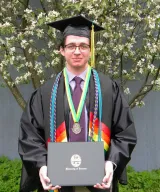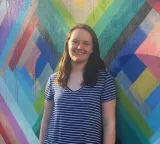Students in our department also have a variety of opportunities to do independent research. These include an upper-level research seminar in which students design and implement their own study, a senior honors thesis in which a student works with a faculty advisor on a project chosen by the student, and readings and research courses in which a student and a faculty member explore a specific topic of mutual interest. In addition, students occasionally serve as research assistants on ongoing faculty research projects.
Can I Do an Internship for Sociology Credit?
The internship coordinator for the department is Professor Alice Fothergill. Presently, the only way for students to get sociology credit for an internship is through Professor Fothergill's spring semester course, SOC 3991. Internship Seminar in SOC. The course allows students to participate in internships in local organizations for the spring semester. Generally, internships require ten hours a week of service in the agency site for three hours of course credit. Sociology requires a rigorous scholarly component as well, including bi-weekly meetings, a sociological literature review, and a final paper. Students who want an internship experience but do not need sociology credit might consider registering for CAS 2920 Communities of Practice or CAS 2991 Internship. For more information on sociology internships, contact Alice Fothergill at Alice.Fothergill@uvm.edu.
Does UVM Offer a Criminal Justice Degree?
No, but the sociology department offers a concentration in Crime and Criminal Justice. We offer courses on Deviance & Social Control, Global Deviance, Criminal Justice, Crime, Sociology of Law, and Corrections. One can certainly explore that interest and gain expertise within the sociology major. There is also a Law and Society Minor.
International Sociology Honors Society
UVM Sociology is a member of Alpha Kappa Delta, the International Sociology Honors Society. Our advanced majors and minors who excel are inducted into the Society in an awards ceremony every spring semester. This distinct honor can be helpful to students’ future career advancement and gives them a way to stay connected to the field of sociology.
Teaching Assistants/Aids
Teaching Assistants are wanted for Soc. 1500 (Hatanaka, Fothergill); Soc 1260 (Abbasi); Soc. 1370 (Matsumoto); Soc 1990 (Shaffer); Soc. 2500 (Strickler). TAs are majors and minors who have taken at least 12 hours of Sociology and assist the faculty member by conducting weekly discussion groups, grading, and other responsibilities. Students register for Soc. 2994, giving them 3 credits at the 2000-level. In a few cases, TAs may be considered for pay instead of credit. If interested, please complete the TA application. Permission of the instructor is necessary and an override required. Deadline requested is December 1, 2024.
Student Experiences
Classroom and Real-world Research Leads to PHD Program

As a high school student at Burr & Burton Academy in Manchester, Vt., Catherine Burgess ’20 discovered the best match for exploring her interests in criminal justice was in her home state.
“I read that UVM’s sociology department offered a concentration in crime and criminal justice. It seemed like an ideal route to explore the mechanisms of change in the prison system,” she recalls.
Her passion for public policy and social justice deepened at UVM, and she was recently accepted to a University of Arizona sociology Ph.D. program which begins in the fall. Burgess credits her success at UVM to the mix of classroom theory, independent research, and on-the-ground experience.
“I learned a lot about justice and ethics generally, but removing myself from the classroom and getting into the field to explore first-hand how prisons operate—that gave me a much deeper understanding of the criminal justice system,” she said.
A highlight of her UVM career was participating in the Shepherd Higher Education Consortium on Poverty’s Summer Internship Program after her sophomore year. It was a fully-funded eight-week internship at a public defender’s office in West Virginia.
Closer to home, she worked with UVM’s Liberal Arts in Prison Program (LAPP) which provides college courses for inmates, giving incarcerated citizens the tools they need to successfully reintegrate into society. Burgess participated in informal volleyball games with women inmates in the Chittenden Regional Correctional Facility in South Burlington. She also sat next to them in a unique class consisting of UVM undergraduates and inmates.
“They (the inmates) had a lot of insights into how the system works and how important support mechanisms like mental health service and community centers are for successful re-entry into society.”
Burgess completed ethnographic research at UVM, resulting in her honors thesis “Please Us or Fight Us”: Masculinity and Social Control in a Drug Court, which she hopes to publish with the help of her advisor Professor Eleanor Miller.
Her UVM sociology experience, she says, provided a framework for viewing crime less as an accumulation of individual acts but as outcomes from factors like systematic racism.
“If the framework fits—and it really did for me—you learn how to view the world through a sociological lens,” Burgess said. “In my freshman year, our professors taught us to use our ‘sociological imagination’ to see underlying structural patterns in social systems. By my senior year, I thought of it as a muscle you can flex.”
One Goal, Two Majors, Unlimited Opportunities

As a high school senior in Chappaqua, N.Y., Abby Fuirst was on the fence about her college choice.
“I was looking for a small liberal arts school and I worried that I might get lost at UVM,” she recalls. “When I visited campus for the first time, I told my mom ‘you can just leave me off here and I’ll be fine.’”
She was attracted by the university’s strong environmental studies program but became intrigued with other courses she was taking, including a class on race relations taught by Associate Professor of Sociology Nikki Khanna. The experience led her to explore a major in sociology, and she discovered she could arrange her course schedule to major in both disciplines.
“I’m really passionate about figuring out ways we can build more resilient societies in the face of climate change,” she said. “ENVS and sociology give me different ways of thinking about those problems.”
She ticks off one by one the other goals she set for herself at UVM: studying abroad (a semester during her junior year at Stockholm University in Sweden); participating in research (working with a Columbia University researcher on national disaster preparedness plans for child care centers); and garnering a stimulating internship (she worked for U.S. Senator Patrick Leahy’s state office last semester).
“As someone coming from a very large state, I’m amazed at how close I am to people doing really important things here in Burlington and Vermont,” Fuirst says.
She met Senator Leahy on her first day of work in his Burlington office, and treasures a personal thank-you note she received from him after the internship ended.
Working with the Senator’s constituents on a daily basis, Fuirst developed keen insights into the daily workings of government. She’s particularly proud of the fact that two reports she wrote were read on the Senate floor by Leahy and put into the Library of Congress.
Fuirst has been accepted for a FEMA Corps position based in Sacramento where she will help communities all across the country prepare for and respond to natural disasters like fire, floods or extreme weather events.
“Afterwards I could see myself going to graduate school in public administration. I’d like to work in government or in the non-profit sector, because I think the best way to make change is through policy.”
While lining up with her dorm during her first-year convocation, Fuirst remembers standing next to Kelly Garber '20, who is now her best friend and a fellow sociology major. Given the alphabetical proximity of their last names, they’ll be standing next to each other again when they are called to the stage to receive their degrees during May Commencement.
“I feel like I was able to take advantage of opportunities that might not have come my way at a smaller school,” she says now. “At the same time there is this sense of belonging. UVM was definitely the right choice for me.”
College Journey Leads to Yale Law School

James Sanchez’s personal and academic journey led them to a small liberal arts college, a local community college, and finally the University of Vermont. That journey will continue next fall as they take up their studies at Yale Law School.
After attending Bryn Mawr College for a semester, they took a medical leave of absence and returned to their home town of Middlebury, Vt.
Sanchez enrolled in the Community College of Vermont and made a big impact. They worked as a teaching assistant and academic mentor during their two-year tenure there, and received a Student Leadership Scholarship at the CCV Middlebury campus.
It was at CCV that they changed their name to James and began navigating the world as a visibly trans person, while facilitating a queer youth group for local high school students.
“It was amazing to see how many trans students showed up,” Sanchez said. “I’m sure they got tired of hearing me say ‘when I was your age,’ but I never got tired of seeing how much had changed since I’d been a student at that same high school.”
After graduating from CCV with an associate of arts degree, Sanchez went on to complete their undergraduate degree at UVM.
Commuting from Middlebury, they took advantage of the local GMT bus that drops off travelers at the corner of South Prospect and Main Streets. The stop is right next door from the Prism Center, which serves queer and trans communities at UVM—Sanchez found a welcoming community and a place to hang out between classes.
“I was known as the couch gremlin,” Sanchez says, earning the moniker for all the time they spent at the Center.
Their academic home was UVM‘s sociology department—they were particularly drawn to courses taught by Professor Eleanor Miller on criminal justice. When Miller announced the department’s new Crime and Criminal Justice concentration, Sanchez was among the first to sign up.
Miller also served as advisor for their Honors thesis “Urban Undesirables: Beggars in the Era of the Ugly Law.” Sanchez analyzed historical newspaper articles from the Progressive Era to better understand how the media helped legitimize punitive interventions against the homeless.
Sanchez received the Outstanding Junior Major award from the sociology department in 2018. In May, he graduated summa cum laude and was named Outstanding Senior Major. He also received the Jeanette R. Folta Memorial Award, the sociology department award given annually to the graduating senior who has shown special fortitude in meeting significant challenges, has succeeded academically, and has plans to pursue graduate education.
During commencement week, they made the student address at UVM’s Rainbow Graduation, an annual event hosted by the Prism Center.
“As a low income, queer, trans, Hispanic, chronically ill student without parents” they said, “I’ve accomplished more than I thought possible.”
Sanchez’s academic experience at UVM is fueling their ambitions at Yale. “I'm interested in both criminal justice reform and disability and housing advocacy,” they said. “Eventually I’d like to work in academia.”
Multiple Paths Lead Back to Sociology

At UVM, junior Sheldon Burnell '20 discovered that many of his interests including criminal justice, law, journalism, education and advocacy led him to the same place: the discipline of sociology.
When he attended high school in Brattleboro, Vt., he served on a restorative justice committee which examined alternatives to punitive measures like suspensions for students who misbehaved.
“I suppose I had that experience in the back of my mind when I came to UVM,” he said, “but I wasn’t sure what a sociology major would lead to,” he said. “It wasn’t a linear process, but I eventually discovered everything I was interested in connected me to sociology.”
The first step was a sociology TAP course his first year titled “Science Fiction and Society” and he was intrigued. Then he took “Mass Media in Modern Society” course, which addressed his interest in journalism. As his academic career progressed, he took sociology courses touching on population dynamics, the environment, social movements, global deviance, terrorism, and immigration.
“The discipline covers so much ground I feel like whatever your specific interest is, if you take sociology you can find a professor who is exploring a facet that interests you.”
Burnell also had plenty of opportunities to roll up his sleeves and apply classwork to real-world situations. In a service-learning course with Sociology Professor Kathy Fox, he and a fellow UVM student created a Criminal Justice Club. They planned a kickoff event by inviting local experts in law enforcement including Vermont Assistant Attorney General David Scherr. Over 40 students attended, and Burnell has plans to have the club officially approved by the Student Government Association next year.
Burnell also discovered he could take a Law and Society minor through the sociology department, which gives him access to courses in law from across the university—he’ll be taking business law and real estate law next semester through UVM's Grossman Business School
“If I hadn’t discovered sociology I’m not sure if I’d have made my way to law,” he says. After graduation, Burnell plans on gaining some more real-world experience, perhaps working as a paralegal, while studying for the LSATS in preparation for law school.
An Inside Look at the Criminal Justice System

A visitor to sociology professor Ellie Miller’s “Race, Gender & Crime” class last year made a deep impression on Taline Torossian ‘19. It was Susan Randall, founder and owner of VTPrivateye, who talked to students about how her Burlington firm helps public defenders assemble cases for indigent clients who can’t afford to hire their own attorneys.
“I was really intrigued by the work they did so I applied for an internship there last semester. The next thing I knew I was going to their office every Monday and Wednesday, doing research for their clients,” Torossian said.
Each week, she met with Randall and other members of the team to go over current and pending cases. Then she plunged into background checks, making record requests, and poring through public records. Each case represented a mini-research project, capped by a report for the public defender to give shape and substance to each defendant’s story.
Cases she spent hours researching might only receive a five-minute hearing before a busy judge struggling to get through the days docket.
“One thing Susan told me which really hit home is that this work brings some humanity into one of dozens of cases a judge may have seen that day. The client isn’t just another docket number—they are a person of consequence.”
Torossian was grateful that the internship provided her with an inside look at the criminal justice system, taking her out of her comfort zone. An investigator took her to visit a client in the Northwest Correctional Facility in Saint Albans, Vt. She made field visits to the homes of witnesses to help conduct interviews and take statements. Early in her internship she was invited to a trial of a client accused of burglary. Sitting behind the defense table, she witnessed how difficult it was for public defenders to represent clients against deeply-resourced prosecutorial teams.
“We try to present each client as a whole, complicated person who is more than just the worst thing they ever did,” she explained.
Torossian is a dual sociology and political science major, and the internship experience bridged the gap between academia and real world.
“In my high-level courses we talk about the difference between sitting in the classroom and talking about ways of solving problems and actually interacting with the people who are affected,” she said. “Both perspectives are valuable and inform each other.”
Her experience at VTPrivateye has already led to a job opportunity—a public defender she worked with has hired her part time as a research assistant. After graduation she is planning to work at a law firm for a year or two before moving on to law school.
Internship Focuses Passion for Social Justice

As a junior in high school, Maddie Teeven '20 of Watertown, Mass., completed a thorough college search, compiling a list of 15 potential schools and making ten campus visits.
“From the moment I set foot on campus, I knew this is where I wanted to go to,” she said of her first visit to UVM. Part of it was the special Burlington “vibe,” the proximity to the mountains and the water, the unaffected friendliness of the people she met. Most importantly, she felt like she could be herself here.
“I struggled in high school at times because everyone was the kind of the same, or trying to be the same. At UVM I felt like it was OK to be who I was.”
She initially declared psychology as a major, but was more interested in political science and a class she took in social work. She shared her impressions with her advisor who suggested sociology.
“He explained how broad the field is and all the different career options it could lead to. I felt like I'd found the right fit.”
Teeven is passionate about what she sees as necessary reforms to the U.S. incarceration system. “People in jail are seen only as criminals—we don’t see the social factors that contributed to them becoming offenders. Many of them are victims of mental illness or physical or sexual abuse. Many turn to drugs. Our society needs to focus on social reforms to prevent these outcomes.”
A criminal justice class in New Zealand during her junior year semester abroad sharpened her focus. “The class really hooked me,” Teeven said. “New Zealand has a strong reputation for criminal justice. Our (U.S.) system was mostly held up as a model of what not to do. As the only American in class, it was interesting hearing this perspective and how baffling the other students found our system.”
Teeven developed an interest in the role drug addiction, particularly opioids, play in our prison system. She researched this problem during a recent internship with the Burlington City Police Department. Teeven worked under one of the police chief’s assistants doing social media for the department. She frequently did “ridealongs,” travelling in patrol cars as officers answered calls.
“Because there is so much mistrust, my role was to humanize police—show through their daily activities that these are people who have a challenging job and who are trying to do the right thing.”
She attended meetings that brought together politicians, social workers and law enforcement agents working to identify strategies to address opioid addiction. She also sat in on treatment court meetings, where people with addictions were periodically evaluated for progress in a 5-step abstinence program.
Teeven understands what they are up against—most addicts come from impoverished backgrounds. But there many bright moments that suggested promise.
“I witnessed a graduation ceremony where people completing the program got recognized. In one case a judge came forward and gave big hug to one of the participants who had really struggled, but persevered. It showed me people in the system really do care.”
Sociology Major Interns for Politicorps

A double-major in art history and sociology, Abby Boulton ‘18 of Portland, Ore., is pursuing a summer internship with PolitiCorps, an organization specializing in training future leaders in political organization and leadership. As a PolitiCorps Fellow, Boulton is working on a variety of political issues that directly impact citizens of Oregon including local 2018 district attorney races. Another project: working to increase the percentage of women, non-binary, and minority people on corporate boards as part of the 2020 Women on Boards initiative. “It was my sociological interests that motivated me to seek out political internships,” she explains. “This experience is a wonderful way to add a practical application to many of the theoretical topics I have studied in regard to race, gender, class and equality.”
Anthony Dimario Tweets for Change

Sociology honors student Anthony DiMario '18 engaged in an unusual learning experience in the spring of 2017. Along with fellow student Sumner LeBaron-Brien ‘18, DiMario managed former Vermont Governor Peter Shumlin’s twitter account. DiMario wrote his senior thesis on how media coverage focused on societal issues that led to the opiate addiction crisis, including the role of the pharmaceutical industry in promoting painkillers. In former Governor Shumlin's Twitter account, he found a high-profile forum to test his knowledge – a forum that comes with 20,000 followers. Shumlin was one of the first governors to call attention to the unfolding opiate crisis, devoting his entire state-of-the-state address to the issue in 2014. He remains a strong advocate for reforming a system that widely prescribes drugs. “It is an awesome responsibility” DiMario said. “But it’s a chance to make a real impact on these critical issues.”
Analyzing Human Migration Patterns

Vermont native Hayley Barriere ’19 didn’t have to travel far to get a working knowledge of issues surrounding immigrant and refugee resettlement. A global studies major with a minor in sociology, Barriere recently completed an internship at the U.S. Committee for Refugees and Immigrants/the Vermont Refugee Resettlement Program (USCRI/VRRP) in Colchester, Vt. What’s more, UVM helped fund her living expenses during the internship period through a College of Arts and Sciences Internship Scholarship. In the classroom, Barriere analyzes human migration patterns and the factors behind them. Through her internship she’s getting essential hands-on experience in helping newly arrived refugees and immigrants resettle in the United States. “The most important thing I have realized from my internship is that wherever I end up in the future, I want to spend my life doing important and meaningful work that makes a positive impact on the world."